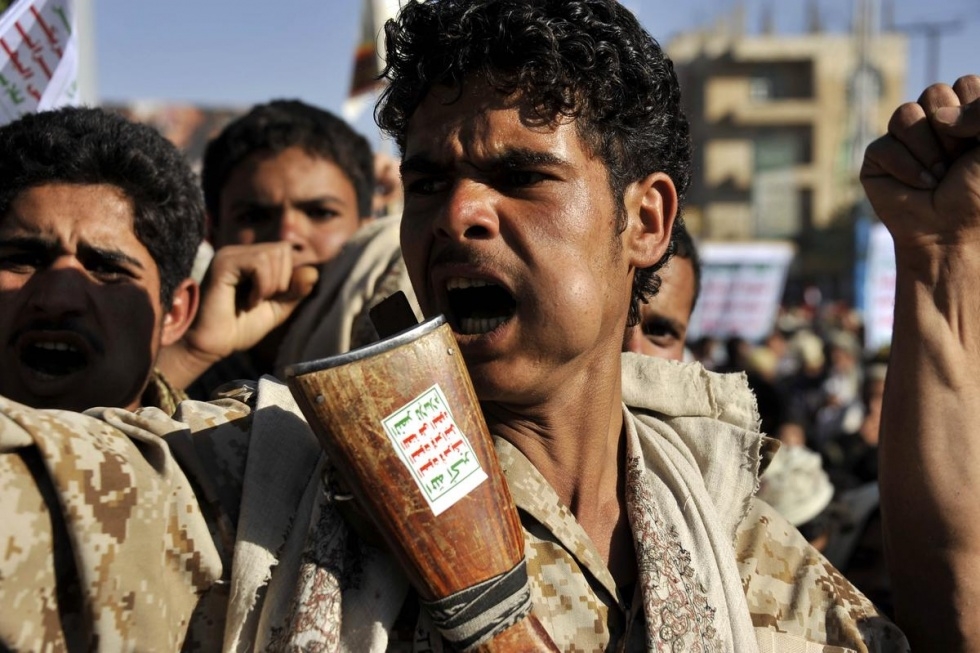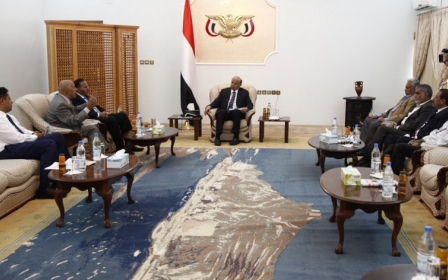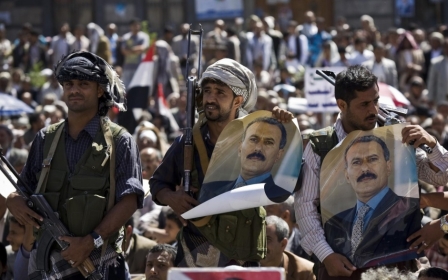Yemen tensions mount as Houthis reportedly storm national dialogue conference

Houthi militiamen stormed the Secretariat of Yemen's national dialogue conference (NDC) on Wednesday evening, according to an NDC spokesperson.
"An armed group loyal to the Houthis stormed the [NDC] secretariat office at a late hour last night," the Secretariat said in a statement.
"This act was one of many which aim at obstructing the path to a peaceful settlement in the country," they said.
They said that the gunmen searched the building and took the keys of the stores and offices and left from the inside while imposing guarding outside the building and ordered a Secretariat employee not to dispose anything without their permission.
So far no explanation has been discerned or offered for the move, though it has been rumoured that documents were seized.
In the wake of the break-in, the Secretariat announced it had stopped its operations in Sanaa, but would continue throughout other parts of the country. It also said that former President Abd Rabbuh Mansour Hadi had asked that their operations be moved to Aden in the south.
Adam Baron, a visiting fellow at the European Council on Foreign Relations said that the ease with which the Houthis conducted such incursions highlighted the grip they now have on Sanaa.
"For better or for worse, the Houthis are more or less indistinguishable from law enforcement or the army in Sanaa right now,” he told Middle East Eye.
He also suggested the break-in may be a purely “symbolic” move to reassert their authority.
A spokesperson from the Houthis, however, denied they were responsible for the storming of the Secretariat, and accused Hadi of being responsible for ordering away the private security around the building.
One source told MEE that the atmosphere was “tense” in Sanaa, with Houthi patrols on the increase.
He also said that orders had been given to evacuate residences in the area around the house of former President Ali Abdullah Saleh, for reasons as of yet unkown.
Saleh left office in 2012 following anti-government demonstrations. However, he has returned to prominence in recent months, following accusations he helped engineer the Houthi takeover.
'Frustration'
Negotiations between the Shiite Houthis - who have seemingly become thedominant force in Yemen since the resignation of former President Hadi in January - and opposition parties in Yemen to bring the country out of a political impasse have so far not yielded results.
UN envoy to Yemen Jamal Benomar on Wednesday said he felt "frustration" over the Shiite Houthi group's reluctance to heed the UN Security Council's (UNSC) recommendations for ending the country's political crisis.
Benomar spoke of his "disappointment due to the Houthis failure to meet the UN Security Council demand to evacuate government installations (in Sanaa) and release those under house arrest, or detained arbitrarily,” adding he had voiced his concerns to the UNSC.
The lack of progress has helped heighten fears about the potential for a protracted conflict in Yemen.
“I think there's a very good chance that what we're witnessing in Yemen now is the calm before the storm,” said Baron.
“When you look at all the indications - and let's not forget that the economy is effectively in freefall - this is a very dangerous time for Yemen.”
Protests against Houthi rule have been near-continuous in Yemen. Thousands demonstrated in Sana'a on Wednesday chanting "Yes to the constitutionally legitimate authority" of Hadi and "No to the coup."
The Rejection movement, formed in late December 2014 and active in the governates of Ibb and Taiz as well as the capital Sana'a, has been a major organiser of opposition to what they see as a “coup” in Sana'a and has frequently clashed with the Houthis.
Wednesday's demonstration, organised by the group, was met with knives and batons from the Houthis, according to the demonstrators.
They added that two protesters were wounded and 15 others were led away by gunmen to unknown locations.
'Honest brokers'
Though he offered his resignation in January, last month Hadi managed to flee Aden in the south of the country – where he maintains his strongest support base – and reasserted himself as rightful President of Yemen, demanding the Houthis leave the capital Sana'a.
Shortly after, a number of Yemen's neighbours in the Gulf Cooperation Counicl (GCC) announced they would be reopening their hitherto closed embassies in Aden.
“The key issue is that's being seen as taking sides and there is the issue of things escalating, particularly as negotiations are continuing there is this idea that increasingly various parties are not seen as honest brokers,” said Baron.
“Simultaneously, the meetings that are going on in Aden really do risk enflaming the longstanding mistrust that the Houthis and, for that matter, former President Saleh's backers, have in the international community.”
Perhaps sensing this, the US – who closed their embassy in Yemen last month - on Wednesday restated that it had no intention of moving its embassy to Aden, instead stating it would be operating out of Jeddah in Saudi Arabia.
“It is in every Yemeni party's interest, whether you're talking about the Houthis, the Muslim Brother, Hadi's people, Saleh's people – to reach an agreement of some sort of power-sharing, something that fits all their mutual interests,” said Baron.
“The issue is that there is so much distrust, due in part to the way the transition was run, due in part to endemic issues with Yemen's political culture, there's so much mistrust that everyone, instead of realising that everyone has to work together in order to avert catastrophe, everyone is instead looking for the knife coming out of the back, while sharpening up their own blades to stick in someone else if necessary.”
New MEE newsletter: Jerusalem Dispatch
Sign up to get the latest insights and analysis on Israel-Palestine, alongside Turkey Unpacked and other MEE newsletters
Middle East Eye delivers independent and unrivalled coverage and analysis of the Middle East, North Africa and beyond. To learn more about republishing this content and the associated fees, please fill out this form. More about MEE can be found here.




